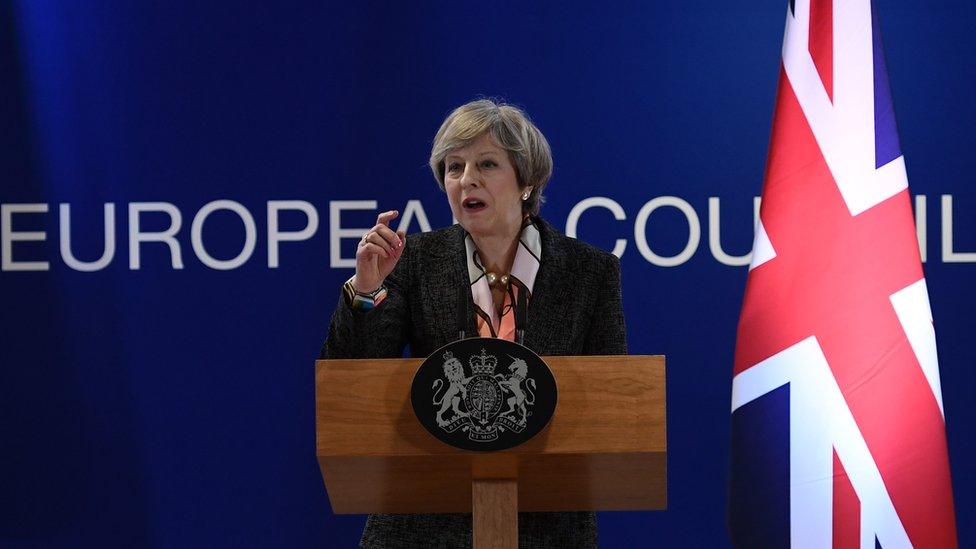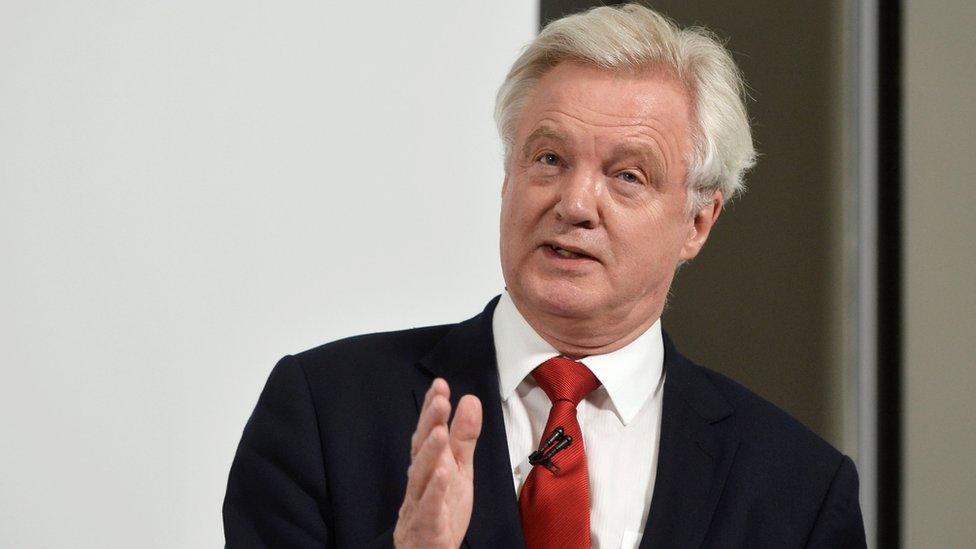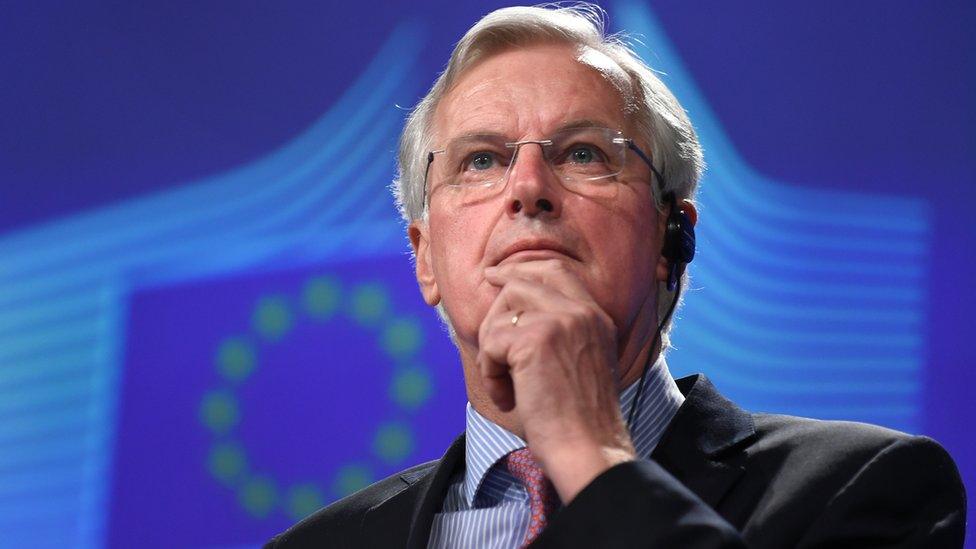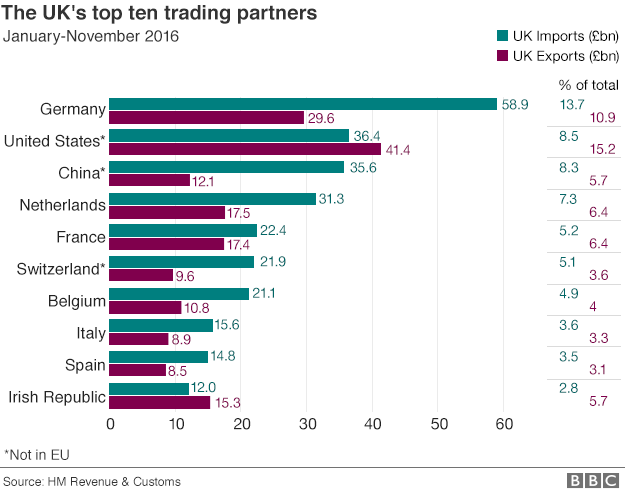Brexit meets Alice in Wonderland
- Published

Theresa May's election gamble backfired and the Brexit agenda remains wide open
It feels a bit like Alice in Wonderland.
Politics in the UK turned inside out and upside down after last week's general election. Things that certainly were not going to happen (like Labour's Jeremy Corbyn doing well) did, while what was definitely expected to happen (a Tory majority for Theresa May) did not.
The Mad Hatter's Tea Party is scheduled a week from today: that long-awaited face-to-face meeting between the chief Brexit negotiators of the EU and the UK. The very first one since the UK voted to leave the European Union a year ago.
While fireworks and expletives may be ricocheting off the walls behind closed doors, in public both sides will put on their most serious expressions and make out that nothing has changed. At all.
Though, of course, it has.
Nervous wait
With only seven days to go before the Brexit tea party guests sit down at the negotiating table, and with the clock ticking loudly on the limited time allowed for these talks under EU law, the UK is abuzz with cross-party debate about the most basic of basics - what kind of a Brexit this should be.
David Davis may be the UK's chief Brexit negotiator now, and he may trumpet his views loudly, but he could be out of a job in a week, or a month or a year. Along with his boss, the UK prime minister.
Brussels is sharply aware of that.

UK Brexit Secretary David Davis remains Brexit team leader - for now
So everything Mr Davis agrees or disagrees with in talks with Brussels will be taken with a pinch of salt.
In fact, the EU insists that, when it comes to Brexit, "nothing is agreed until everything is agreed".
So only when all the divorce issues have been chewed over and debated by both sides, will the shape of the final Brexit deal become clear.
This is why, at the moment, there is very little appetite in EU circles to talk about Brexit and the political mess in the UK - on or even off the record.

Top EU negotiator Michel Barnier is committed to transparency in the Brexit talks
EU leaders are keeping stumm, as one put it to me, because they feel it would be "suicidal" to be seen to intervene or offer advice to London.
They are waiting for the uncertainty to be clarified, and meanwhile proceeding with the timetable triggered by the UK's Article 50 letter - the formal notification given by Theresa May back in March, that the UK was leaving the EU.
UK rethink?
What there is not here in Brussels or in Berlin, Paris or Rome, is a sense of schadenfreude at the UK prime minister's political own goal at the general election. Amongst EU leaders, that is; there is plenty of snickering and finger-pointing further down the political chain, and in the European press.
There is understanding, though precious little sympathy, in Brussels for the complicated mess the UK finds itself in. That has led to backroom talk of the possibility to extend negotiations beyond the two-year set limit - as long as all the 27 EU member states and European Parliament agree.
The UK could also withdraw its Article 50 letter, any time before the two-year negotiating period is up. Again, as long as there was unanimous acceptance amongst the so-called EU27 and European Parliament.
That option has just been described to me as "Europe's secret wish".
Of course, from the Brussels perspective, nothing would be a better advert for the value of EU membership than having what is perceived as a high-handed, recalcitrant, inherently eurosceptic UK choose to return to the European fold after all.
But there is zero expectation here that that is likely to happen.
Indigestible rhetoric
The EU's working assumption is that Britain is leaving the EU.
As one high-level European contact of mine put it: no-one here is working on a Plan B.
As for whether it is a hard or soft-boiled, medium-rare or well-done Brexit, Brussels just rolls its eyes.
It is felt here that the texture and flavour of Brexit will only become apparent at the end of the negotiating process.
Until then, Brussels views all Brexit descriptions as political rhetoric, aimed at the British public by UK politicians as a means of political point-scoring rather than a serious element of Brexit negotiations.

But after all the vitriol during the UK's EU referendum campaign aimed against the European Court of Justice, the freedom of movement of EU citizens, regulations imposed by and payments made to Brussels, the EU is not expecting the UK to ask to remain a full member of the European single market (though perhaps the customs union).
EU morale boosted
The ball is firmly in Downing Street.
The EU says it's ready and waiting - as of yesterday.
One source commented that he's never seen Brussels so sanguine over a contentious issue.
For once, EU member states really are aligned and calm, he told me, We have done our homework and we are ready for Brexit. It's the Brits who have to sort themselves out.
In the meantime, the EU is concentrating on other pressing matters: security and defence, Russia, eurozone problems in Greece and the rule of law in Hungary and Poland.
The mood in Brussels is increasingly confident.
Not so much because of the UK's unstable Brexit position, but thanks to the electoral success this weekend of France's pro-EU President Emmanuel Macron and his new centrist party, as well as Sunday's drubbing in local elections for Italy's eurosceptic Five Star movement, and the steady return to popularity for the EU's grande dame, Chancellor Angela Merkel, ahead of Germany's autumn elections.
With or without the UK, the EU is determinedly looking forward.